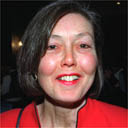
Graduates of Oxford University will go decorously to the polls tomorrow to elect a professor of poetry - the most coveted post after poet laureate.
If undergraduates had a say there is an indecorously strong chance they would opt for one of the outsiders, Ian McMillan, who has been described as the Shirley Bassey of performance poetry. McMillan has been writer in residence for, among many others, Barnsley football club and Humberside police. He is cherished for a verse satire on a previous poet laureate, entitled Ted Hughes is Elvis Presley:
At my poetry readings I sneer and rock my hips.
I stride the moors in a satin jump suit,
Bloated as the full moon.
This is why the elders have taken care throughout the chair's 304-year-old history never to give undergraduates a say. Their anarchic-leaning populist tastes might well have made Muhammad Ali a walkover if they had been allowed to vote when the heavyweight boxer was offered a nomination by two dons in the 1970s.
Instead the winner out of five runners is likelier to be one of two respected, more mainstream, multi-award winning poets, Peter Porter or the Canadian Anne Carson.
The establishment candidate is Christopher Ricks, a wittily accessible literary professor, lover of puns and Bob Dylan, who is not best known for his own verse. Ricks is backed by nine Oxford college principals, the former professor of poetry James Fenton, and 54 other MAs.
But an anti-establishment backlash often strikes during the five-yearly poetry elections. The last half-century has shown a strong preference for candidates with reputations as poets rather than scholars. Professors have included Cecil Day-Lewis, WH Auden, who gave the post its modern prestige, Robert Graves, Edmund Blunden, Roy Fuller, John Wain, Peter Levi, Seamus Heaney, and this year's outgoing professor, Paul Muldoon.
But even the muse is no guarantee. The great US poet Robert Lowell was humiliatingly beaten, partly because his campaign was seen as too based on the high tables.
Tomorrow's biggest wild card is that the poll is the first to be held with an electorate of 135,000 graduates instead of the estimated 50,000 who have bothered to pay £10 and register for the MAs to which all Oxford graduates are entitled. In theory this should make the result less Oxford and academic-centred, more wordly and populist.
The widening of the franchise could do as much for Oxford's hotel industry as for democracy. Electors still have to go to Oxford. Postal or internet voting have not been considered. The polling station has been moved from the neo-classical Sheldonian Theatre to the Divinity School.
However, the appealing flummery that went with the event has been modernised. Voters no longer need to wear MA gowns, and they now use ballot boxes instead of handing their papers to a pro-vice chancellor who used to doff his ceremonial hat in return. The dignitary was in danger of spraining his arm with a bigger turnout.
The system has encouraged a recent undergraduate, Mark Walker, to stand. In a turnout of only a few hundred he could hope that the votes of fellow graduates who knew him as the Oxford Union president might squeak him home. In the last contested poetry election, in 1994, only 451 voted.
Campaigning so far has been sedate. Potent names among Anne Carson's nominations include the scholar and author Marina Warner, the poet Ruth Padel, and JRR Tolkien's daughter, Priscilla. A flysheet (campaign document) circulated on her behalf calls her a distinguished, original, classically inclined poet who is creative with students and explores differences between male and female experience.
Porter's nominees include the poet laureate, Andrew Motion, and the poets Alan Brownjohn, UA Fanthorpe and John Fuller, and the novelist Alan Hollinghurst. His flysheet says he is a spirited, funny, moving, often sardonic poet of high calibre, experienced at lecturing, "acutely conscious of the saving values of culture in an inimical world".
The new professor is required to lecture three times a year. The salary is £5,457, but he or she can make several times this figure from the enhanced literary profile the post confers.
WH Auden
The More Loving One
Looking up at the stars, I know quite well
That, for all they care, I can go to hell,
But on earth indifference is the least
We have to dread from man or beast.
Ian McMillan
Bosnia Festival
At 10.00am mime show
By The Shuffling Headscarves.
Nothing much happens;
Some shuffling, weeping. Mimed weeping, that is.
(mocking the stylised TV reporting of the Balkans conflict)
Anne Carson
The Beauty of the Husband
Loyal to nothing
my husband. So why did I love him from early girlhood to late middle age
and the divorce decree came in the mail?
Beauty. No great secret. Not ashamed to say I loved him for his beauty.
Peter Porter
A Consumer's Report
The name of the product I tested is Life...
It seemed gentle on the hands
but left an embarrassing deposit behind.

